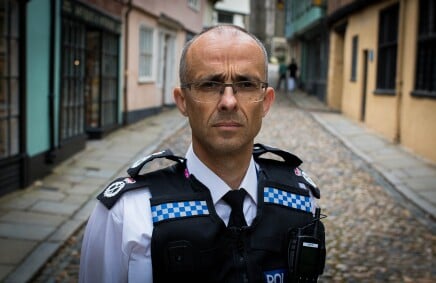Police budget 2025/26 consultation
A message from your Police & Crime Commissioner Sarah Taylor
The Police Budget 2025/26 budget consultation has now closed.
As your elected Police and Crime Commissioner (PCC), one of my key responsibilities is to ensure that Norfolk Constabulary maintains a balanced budget while ensuring they also have the resources needed to investigate crime, support victims and keep Norfolk safe.
The total policing budget for the current financial year (2024/25) is £211.4 million of which over half (53%) is provided by the Government and the remainder (47%) is raised through council tax.
The budget is divided into two parts: revenue and capital. The revenue part is used for day-to-day running costs, such as police officer salaries and maintaining vehicles; and the capital part is spent on key assets such as police buildings and information technology.

PCC Sarah Taylor
This financial year (2024/25), £186.3 million (88.1%) is being spent on officers and staff, with the remaining £25.1 million (11.9%) spent on everything else, including police buildings, vehicles, fuel costs, equipment, and training. Together this funds every part of policing not just the neighbourhood policing teams, but all the many parts of the police service that we don’t see day-to-day.
As you can see from the infographic below it’s not just frontline policing that needs robust funding.
Services are facing the highest demand from increases in rape and sexual offences. This is demanding both in volume and in the increasing evidential requirements for such cases. There are also growing volumes of digital evidence they now collect and review, and the necessary secure storage for that data comes at a price.
Crown Court backlogs are at eye-watering levels. This impacts on policing because victims are supported for longer, which takes a great deal of time and resources to make sure that they are properly supported – in some cases for years.
My police budget consultation will last for three weeks, beginning Friday 22 November and finishing at 5pm on Friday 13 December. I hope to hear from as many people as possible so I can make an informed decision about how to use the Council Tax precept to fund policing in Norfolk over the coming year.
What I am asking
To fund the policing element of your Council Tax, I would like you to tell me which of the following three approaches you would like me to take when I develop my spending proposals for the next financial year 2025/26.
Before you make that decision, please also take the time to read the information provided in the messages below.
The consultation closes at 5pm on Friday 13 December 2024.
Printed copies of the survey and consultation documents are also available and can be requested by contacting the Office of the Police and Crime Commissioner for Norfolk (OPCCN) in the following ways:
Post: OPCCN, Jubilee House, Building 7, Falconers Chase, Wymondham, Norfolk, NR18 0WW
Telephone: 01953 424455
Email: opccn@norfolk.police.uk
While we wait for the Government to confirm next year’s Police Funding Settlement, we already know that a significant increase in funding is needed if Norfolk Constabulary is to continue its excellent work in keeping Norfolk safe. This increase is needed both to cope with costs and to cope with an increase in demand for services. These costs are expected to increase for several reasons including:
- The impact of inflation on the costs of police officers, staff, supplies and services purchased.
- The volume of high harm crimes such as domestic abuse and sexual offences, which require a highly skilled and technical response to investigate them successfully and to provide support to victims.
The law allows PCCs to raise the policing element of council tax each year, up to a maximum amount before a local referendum is required, in order to meet increased demands and costs. Last year, the increase was £13 (£12.96) for a Band D property. If the same increase were to be used for 2025/26, this would leave the constabulary with a shortfall of £2.9m against the police’s current spending plans.
Without an increase in funding, the Constabulary would struggle to maintain current levels of service, let alone to plan for the future – investing in digital technology and employing a skilled workforce.
Over the last two months, I have been talking with residents across the county about policing and crime. As a new PCC, one of my statutory duties is to publish a Police and Crime Plan. My plan will set out what Norfolk Constabulary’s priorities must be over the next four years and will be published in April 2025.
What people have been saying to me at these engagement events is that they want Norfolk Constabulary to have a much stronger focus on prevention to tackle anti-social behaviour, drugs and knife crime. Another common thread has been the experience of victims being let down by the court system which in turn impacts policing because they are supporting victims for longer, all of which requires more funding.
Norfolk is a remarkable county; a great place to live and work for just over 900,000 people.
It’s also a safer county. Crime here has fallen by around 10%, and we are charging more criminals than any other police force in England and Wales.
Our distinctive policing powers help to maintain law and order and keep you safe, and feeling safe in your homes, communities, and online.
My job is to ensure Norfolk Constabulary provides the exceptional service befitting this exceptional county, its communities, and its residents.
Policing continues to play a unique role in society, but in a very different social context to the one I joined as an officer in 1999.

Chief Constable Paul Sanford
Today’s police officers and staff operate in a difficult and challenging landscape with more forms of criminality - as well as more complex forms of crime - a criminal justice system under enormous pressure, and greater scrutiny of policing standards and culture by those inside and outside of policing.
However, my commitment to delivering exceptional policing and protecting communities from harm remains the same as when I joined 25 years ago.
This means getting the basics right; prioritising the core services we know you value the most: helping to keep our communities safe, answering calls, focussing on victims and the needs of the public, protecting the most vulnerable members of our society - including signposting to agencies best placed to officer specialist support - problem solving, preventing crime, investigating crime, and catching criminals.
Figures released in August from The Office for National Statistics confirmed we have the highest solved rate for shoplifting offences in England and Wales. We’re currently solving nearly half of all shoplifting cases – more than any other police force.
We deal with shoplifting as part of our core business, targeting prolific offenders, seeking orders such as Criminal Behaviour Orders to prevent reoffending, working closely with retailers who suffer financial losses and utilising technology.
Yet again, focussing on the basics: making sure shoplifters see police officers out and about when they commit crime, ensuring we’re detecting these crimes and that there are adequate deterrents.
In the latest inspection from His Majesty’s Inspectorate of Constabulary, Fire and Rescue Services (HMICFRS) – an assessment of 10 areas of policing called the Police Effectiveness Efficient and Legitimacy (PEEL) - we were judged to be good at preventing and deterring crime, charging more criminals than any other force in the country and making significant efforts to improve investigation standards.
It described our neighbourhood policing services as understanding and responding to the needs of our communities, and highlighted our partnership working to tackle emerging and persistent antisocial behaviour.
As you would expect, we’re addressing those areas where inspectors told us we need to improve, including how we respond to the public, how risk assessments are managed in some domestic abuse cases and how the force protects vulnerable people.
I’m proud of the improvements we have made, and have been highlighted by inspectors, but we know more needs to be done.
That said, I must also be realistic and honest; efforts to improve do not come without challenge.
When we move people from one part of the organisation to another to address a particular or immediate need, this comes at an expense to other areas of the constabulary.
The measures we need to take to improve often require long term investment in people and technology. While we await the Government’s Police Funding Settlement for 2025-26, I can tell you the government funding increase for 2024/25 only partly covered mandated pay and pension increases for our officers and staff that were outside the Constabulary’s control.
And with 75% of policing budgets locked into pay and long-term contracts and continued significant inflationary pressures, increasing costs and demands of policing; it’s extremely difficult to find anything leftover to fund sustainable improvements or find any further savings without impacting the service we provide to the public. Additional funding is needed just to maintain the current quality of service.
We are already a lean organisation. I aim to make the best use of every pound given to us, and we’re doing everything possible to identify savings through well-established budget monitoring processes. This is ongoing as we head into the close of 2024.
In everything we do, the trust and support of our communities is essential to achieving our aims and fundamental to the principle of ‘policing by consent’.
I care deeply about issues that I know matter to you too, and my commitment to delivering an exceptional policing service that supports, and has the support, of its communities is as strong as the day I joined.